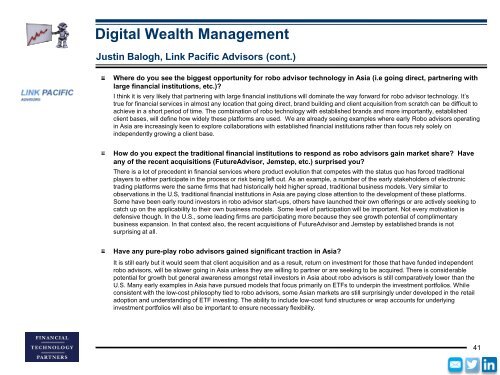Create successful ePaper yourself
Turn your PDF publications into a flip-book with our unique Google optimized e-Paper software.
Digital Wealth Management<br />
Justin Balogh, Link Pacific Advisors (cont.)<br />
Where do you see the biggest opportunity for robo advisor technology in Asia (i.e going direct, partnering with<br />
large financial institutions, etc.)?<br />
I think it is very likely that partnering with large financial institutions will dominate the way forward for robo advisor technology. It’s<br />
true for financial services in almost any location that going direct, brand building and client acquisition from scratch can be difficult to<br />
achieve in a short period of time. The combination of robo technology with established brands and more importantly, established<br />
client bases, will define how widely these platforms are used. We are already seeing examples where early Robo advisors operating<br />
in Asia are increasingly keen to explore collaborations with established financial institutions rather than focus rely solely on<br />
independently growing a client base.<br />
How do you expect the traditional financial institutions to respond as robo advisors gain market share? Have<br />
any of the recent acquisitions (FutureAdvisor, Jemstep, etc.) surprised you?<br />
There is a lot of precedent in financial services where product evolution that competes with the status quo has forced traditional<br />
players to either participate in the process or risk being left out. As an example, a number of the early stakeholders of electronic<br />
trading platforms were the same firms that had historically held higher spread, traditional business models. Very similar to<br />
observations in the U.S, traditional financial institutions in Asia are paying close attention to the development of these platforms.<br />
Some have been early round investors in robo advisor start-ups, others have launched their own offerings or are actively seeking to<br />
catch up on the applicability to their own business models. Some level of participation will be important. Not every motivation is<br />
defensive though. In the U.S., some leading firms are participating more because they see growth potential of complimentary<br />
business expansion. In that context also, the recent acquisitions of FutureAdvisor and Jemstep by established brands is not<br />
surprising at all.<br />
Have any pure-play robo advisors gained significant traction in Asia?<br />
It is still early but it would seem that client acquisition and as a result, return on investment for those that have funded independent<br />
robo advisors, will be slower going in Asia unless they are willing to partner or are seeking to be acquired. There is considerable<br />
potential for growth but general awareness amongst retail investors in Asia about robo advisors is still comparatively lower than the<br />
U.S. Many early examples in Asia have pursued models that focus primarily on ETFs to underpin the investment portfolios. While<br />
consistent with the low-cost philosophy tied to robo advisors, some Asian markets are still surprisingly under developed in the retail<br />
adoption and understanding of ETF investing. The ability to include low-cost fund structures or wrap accounts for underlying<br />
investment portfolios will also be important to ensure necessary flexibility.<br />
41



